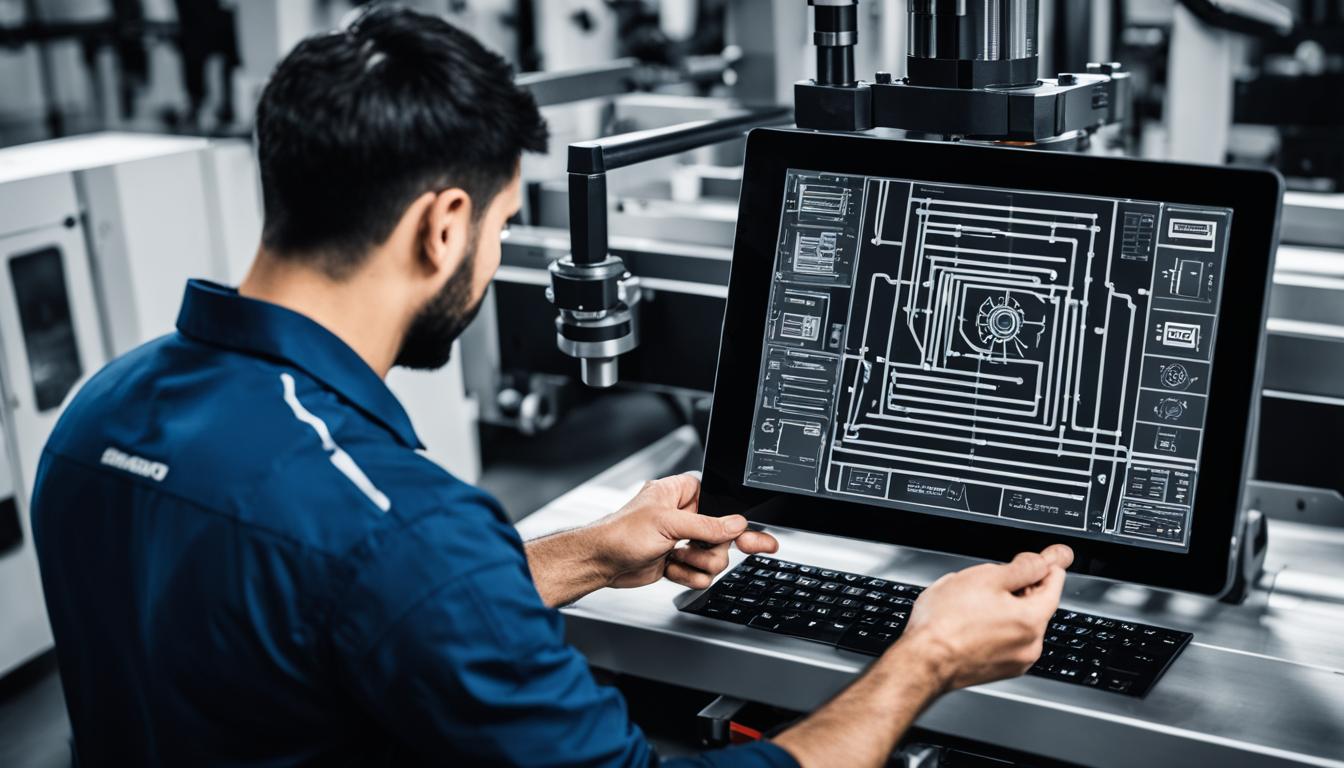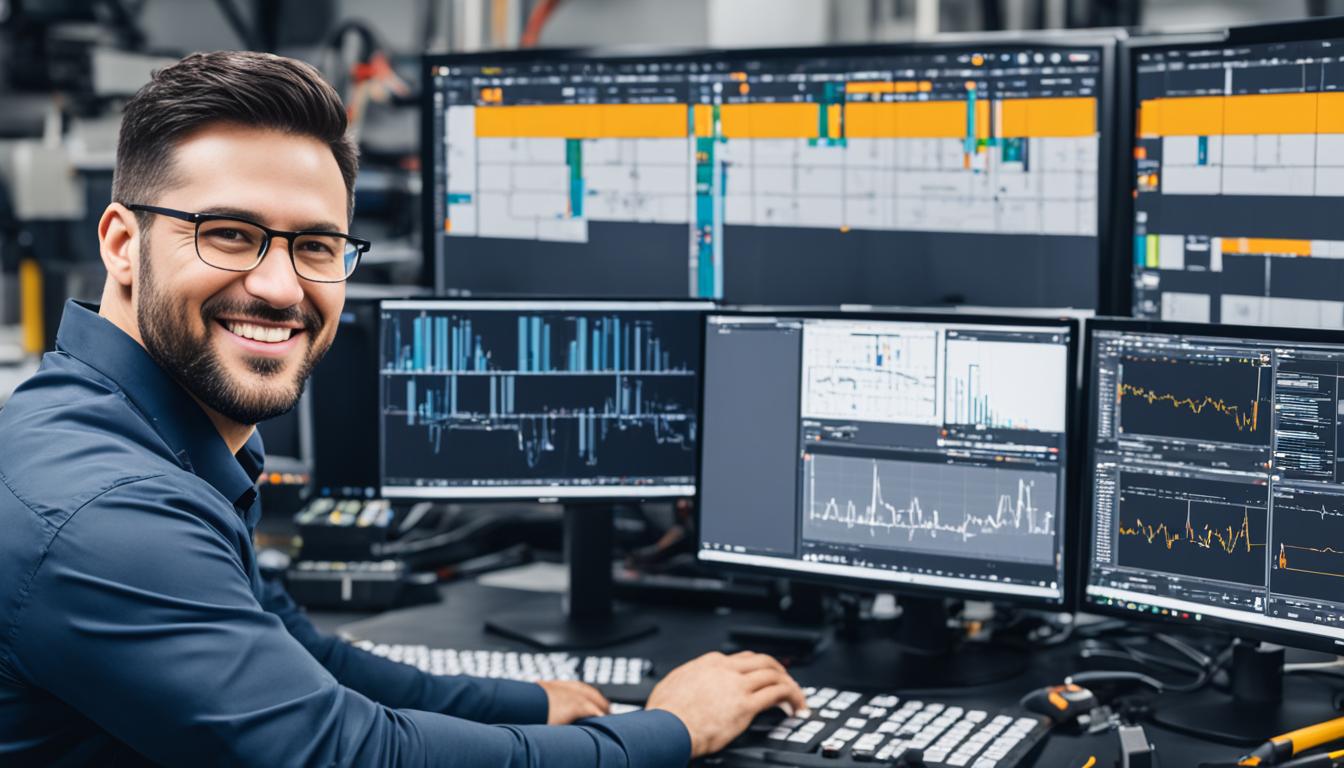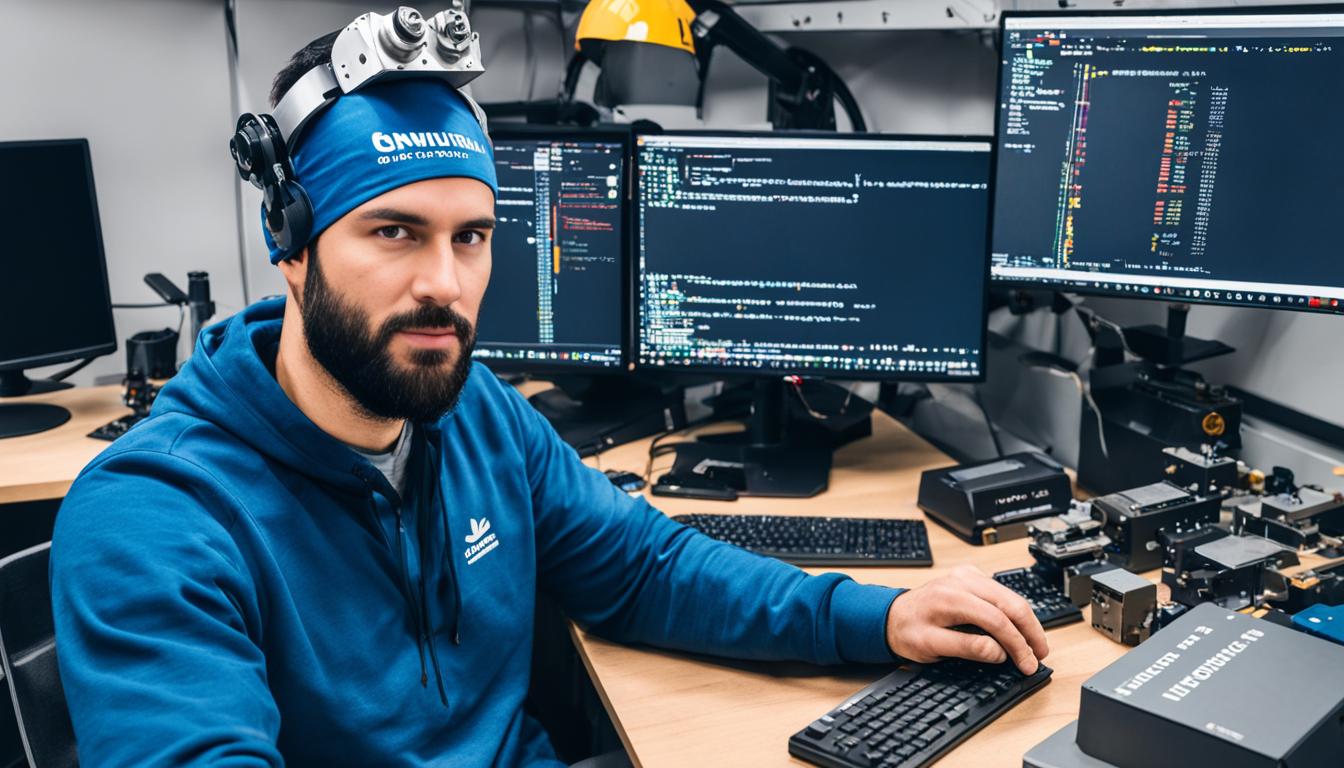Interested in learning CNC programming but not sure where to start? Look no further! Whether you’re a beginner or have some experience, CNC-Academy.com offers a range of courses tailored to help you master CNC programming in no time. With the high demand for skilled individuals in the industry, learning CNC programming can open doors to exciting job opportunities in engineering, manufacturing, and more.
Key Takeaways
- The best way to learn CNC programming is through comprehensive courses.
- CNC programming skills can lead to well-paying job opportunities.
- CNC-Academy.com provides beginner-friendly courses to help you learn at your own pace.
- Gaining hands-on experience is essential for mastering CNC programming.
- Continuous learning and staying updated with advancements in the field are key to a successful career in CNC programming.
Job Opportunities in CNC Programming
Mastering CNC programming opens doors to a wide range of job opportunities in various industries. With your newly acquired skills, you can explore career paths such as:
- CNC Operators
- CNC Tool Setters
- CNC Programmers
- CAD-CAM System Programmers
- CNC Service Technicians
- CNC Applications Engineers
- CNC School Trainers
- CNC Instructors
These job roles are available in engineering, manufacturing, and other companies that utilize CNC machines. By embarking on a CNC programming career, you can enjoy the potential for upward mobility, job security, and higher earning potential.
Job Titles in CNC Programming
If you’re ready to enter the world of CNC programming, you might come across different job titles that encompass your role and responsibilities. Some common job titles in CNC programming include:
- CNC Programmer
- CNC Operator
- CAD/CAM Programmer
- CNC Machinist
- CNC Technician
- CNC Engineer
These job titles represent the diverse range of opportunities in the field and highlight the importance of CNC programming skills across various industries.
Available CNC Programming Courses
If you’re looking to learn CNC programming, CNC-Academy.com offers a variety of courses designed to cater to different skill levels and interests. Whether you’re a beginner starting from scratch or an experienced programmer looking to enhance your skills, there’s a course for you.
Online CNC Programming Courses
Take advantage of the flexibility and convenience of online learning with CNC-Academy.com’s online CNC programming courses. These courses provide comprehensive training in CNC programming and cover a wide range of topics.
Some of the available courses include:
- CNC Programming – Secrets Revealed
- CNC Macro Programming
- CNC Turning Center Programming, Setup & Operation
- CNC Machining Center Programming, Setup & Operation
- And more!
These courses are carefully crafted to provide you with the knowledge and skills needed to excel in CNC programming. Whether you’re interested in mastering the fundamentals or delving into advanced techniques, there’s a course that suits your needs.
CNC Programming Tutorials and Resources
In addition to the courses, CNC-Academy.com also offers a wealth of tutorials and resources to support your learning journey. These tutorials provide step-by-step instructions and helpful tips and tricks for CNC programming.
By enrolling in the CNC programming courses and utilizing the available tutorials and resources, you’ll have access to everything you need to succeed in CNC programming. Develop your skills, expand your knowledge, and unlock new career opportunities in the field.
Learning CNC Programming with G-Code
G-code is the programming language used in CNC programming. It consists of short sets of coordinates and instructions that control the movement and operations of CNC machines. Mastering G-code programming is essential for becoming proficient in CNC programming.
There are different methods of CNC programming, including direct G-code programming, CAM (Computer-Aided Manufacturing) software, and conversational software. Each method has its advantages and applications, depending on the complexity of the project and the programmer’s preference.
G-code is a concise and powerful language that allows for precise control over CNC machines. With G-code programming, you can define tool paths, set cutting speeds, and control other machine functions. It provides the flexibility and accuracy needed to produce high-quality parts and products.
To effectively program CNC machines, a solid understanding of G-code is crucial. By learning G-code programming, you can gain the skills to write efficient and error-free programs that optimize machine performance and production output.
Direct G-code Programming
Direct G-code programming involves manually writing G-code instructions to control the machine. It requires knowledge of G-code syntax and an understanding of machine operations. This method offers maximum control and customization but may require more time and effort to write complex programs.
CAM Software
CAM software simplifies the CNC programming process by providing a user-friendly interface to generate G-code. This type of software translates designs into machine-readable code. It offers advanced features like automatic toolpath generation, simulation, and optimization. CAM software significantly reduces program development time and is commonly used in industries like aerospace, automotive, and prototyping.
Conversational Software
Conversational software allows programmers to create G-code programs using interactive menus and prompts. It eliminates the need to manually write G-code by providing pre-programmed commands for common operations. This type of software is beginner-friendly and ideal for users who prefer a more intuitive programming approach.

| Method | Advantages | Disadvantages |
|---|---|---|
| Direct G-code Programming | Maximum control and customization | Requires knowledge of G-code syntax; time-consuming for complex programs |
| CAM Software | Streamlines program development; automatic toolpath generation; simulation and optimization features | Costly; requires learning the software interface |
| Conversational Software | Beginner-friendly; intuitive programming approach | Less flexibility; limited customization options |
Benefits of CNC Programming
Learning CNC programming comes with a multitude of advantages that can positively impact your career and the manufacturing processes. Here are some key benefits of learning CNC programming:
- Quality Control and Consistency in Production: CNC programming allows for precise control over manufacturing processes, resulting in consistent and high-quality production outcomes. By utilizing CNC machines, you can ensure that each product or component meets the required specifications, minimizing errors and maximizing customer satisfaction.
- Automation of Processes: One of the significant advantages of CNC programming is the ability to automate manufacturing processes. CNC machines can be programmed to complete repetitive tasks efficiently and accurately, reducing the need for constant manual intervention. This automation not only increases productivity but also frees up valuable time for operators to focus on other critical tasks.
- Ease of Use: CNC programming is generally easier to learn compared to manual operation of CNC machines. With user-friendly software and intuitive interfaces, individuals with basic computer skills can quickly grasp the fundamentals of CNC programming. This accessibility makes CNC programming an ideal skill to acquire for those interested in entering the manufacturing industry or seeking career advancement opportunities.
By harnessing the benefits of CNC programming, you can enhance productivity, improve efficiency, and achieve consistent product quality in manufacturing processes.
| Benefits | Description |
|---|---|
| Quality Control and Consistency in Production | Ensures precise control over manufacturing processes, resulting in consistent and high-quality production outcomes. |
| Automation of Processes | Enables the automation of manufacturing tasks, increasing productivity and reducing the need for constant manual intervention. |
| Ease of Use | CNC programming is generally easier to learn compared to manual operation of CNC machines, making it accessible to individuals with basic computer skills. |
Getting Started with CNC Programming
If you’re interested in diving into the world of CNC programming but don’t know where to begin, don’t worry – we’ve got you covered! In this section, we’ll guide you through the essential steps to kickstart your journey in CNC programming.
1. Take a Beginner-Friendly Course
One of the best ways to start learning CNC programming is by enrolling in a beginner-friendly course. At CNC-Academy.com, we offer a course called “CNC Programming – Secrets Revealed” specifically designed for total beginners and individuals looking to upgrade their skills. This comprehensive course will provide you with a solid foundation in CNC programming, covering everything from basic concepts to advanced techniques.
By following the step-by-step instructions and hands-on exercises provided in the course, you’ll gain the confidence and knowledge needed to start programming CNC machines independently.
2. Gain Hands-On Experience
To further enhance your understanding of CNC programming, it’s highly recommended to gain hands-on experience. Consider working at a machine shop or collaborating with an experienced CNC operator who can mentor you along the way. This practical experience will allow you to apply your theoretical knowledge to real-world scenarios and improve your programming skills.
By immersing yourself in a professional setting, you’ll learn valuable tips, tricks, and best practices for CNC programming. You’ll also gain insights into the challenges and intricacies of operating CNC machines, which will help you become a well-rounded CNC programmer.
3. Practice, Patience, and Continuous Learning
Remember, mastering CNC programming is a journey that requires practice, patience, and continuous learning. The more you practice writing and executing CNC programs, the better you’ll become at it. Take on new projects, experiment with different machining techniques, and challenge yourself to optimize your programs for efficiency.
Additionally, stay updated with the latest advancements and trends in CNC programming. The field is constantly evolving, so it’s crucial to keep learning and adapting your skills accordingly. Explore online resources, attend workshops, and join CNC programming communities to stay connected with fellow enthusiasts and industry professionals.
By following these steps and investing time and effort into your CNC programming education, you’ll be well on your way to becoming a skilled CNC programmer.
| Benefits of Getting Started with CNC Programming |
|---|
| 1. High-demand skill in engineering, manufacturing, and other related fields. |
| 2. Increased job opportunities and potential for higher income. |
| 3. Improved accuracy, productivity, and efficiency in manufacturing processes. |
| 4. Continuous learning and growth in the field. |
Advantages of a CNC Career
A career in CNC programming offers numerous advantages, providing individuals with job security, above-average wages, and opportunities for growth and advancement in the manufacturing industry. With the increasing importance of automation in various industries, the demand for skilled CNC programmers is on the rise. By developing the necessary skills and gaining experience in CNC programming, you can secure a stable career with competitive wages.
One of the significant advantages of working in CNC programming is job security. As automation continues to revolutionize the manufacturing industry, companies rely heavily on CNC machines to streamline production processes. Skilled CNC programmers are essential for operating and maintaining these machines, ensuring their smooth functioning. With the right expertise, you can secure a steady job and minimize the risk of unemployment.
CNC programming also offers above-average wages compared to many other professions. The specialized skills and knowledge required in this field command higher salaries. As you gain experience and expertise in CNC programming, your earning potential increases. This provides financial stability and the opportunity to enjoy a comfortable lifestyle.
Furthermore, pursuing a career in CNC programming opens up opportunities for growth and advancement. As the manufacturing industry continues to evolve, new technologies and techniques are constantly emerging. By staying updated with the latest developments in CNC programming, you can position yourself as a valuable asset to employers and find a path for career progression. Whether it’s through becoming a lead CNC programmer, transitioning to a managerial role, or even starting your own CNC programming business, the possibilities for advancement are abundant.

Training and Education for CNC Programming
If you’re looking to develop your skills in CNC programming, there are two main avenues you can explore: enrolling in courses offered by CNC-Academy.com or gaining hands-on experience in a machine shop. Both options provide valuable opportunities for learning and growth in the field of CNC programming.
CNC Programming Courses
CNC-Academy.com offers a wide range of courses tailored to suit individuals at different skill levels, from beginners to advanced programmers. These courses provide comprehensive training in CNC programming, covering various topics and techniques essential to mastering this valuable skill. By enrolling in these courses, you will gain a solid foundation and develop the necessary expertise to succeed in the field of CNC programming.
Some of the courses offered by CNC-Academy.com include:
- CNC Programming – Secrets Revealed
- CNC Macro Programming
- CNC Turning Center Programming, Setup & Operation
- CNC Machining Center Programming, Setup & Operation
These courses cover a wide range of subjects, including g-code programming, machine setup, and operation techniques. By completing these courses, you will acquire the knowledge and skills needed to excel in the CNC programming industry.
Gaining Hands-On Experience
In addition to taking courses, gaining hands-on experience working in a machine shop can greatly enhance your understanding of CNC programming. Working alongside experienced CNC operators and programmers will provide you with valuable insights and practical knowledge that cannot be learned solely through theory. It will also allow you to apply what you’ve learned in a real-world setting, further solidifying your skills and expertise in CNC programming.
Continuing Education and Staying Updated
Continuous learning and staying updated with advancements in the field are crucial for maintaining a successful career in CNC programming. As technology evolves, new techniques and tools are introduced, making it essential to keep up with the latest trends and developments. This can be achieved through ongoing education, attending workshops and seminars, and actively participating in industry forums and communities. By staying informed and constantly improving your skills, you can stay ahead in this ever-evolving field.
Remember, whether you choose to pursue formal training through CNC programming courses or gain practical experience in a machine shop, the key to success lies in continuous learning and a passion for your craft.
Future Trends and Opportunities in CNC Programming
The future of CNC programming holds immense potential, driven by new advancements and technologies that are shaping the industry. One of the emerging trends in CNC programming is the integration of artificial intelligence (AI) and machine learning (ML) technologies. By leveraging AI and ML, CNC programmers can enhance automation, optimize manufacturing processes, and improve overall efficiency.
Another exciting opportunity in CNC programming lies in the realm of additive manufacturing, particularly with the rise of technologies like 3D printing. As additive manufacturing continues to evolve, CNC programmers who possess the skills to program and control these advanced machines will be in high demand. This presents an excellent avenue for professionals to explore new possibilities and expand their expertise.
To thrive in the future of CNC programming, it’s crucial to stay abreast of emerging trends and continuously update your skillset. As new technologies and techniques are developed, it’s essential to invest time in learning and adapting to these advancements. By staying proactive and continuously improving your skills, you can position yourself to seize future opportunities and contribute to the evolving landscape of CNC programming.
